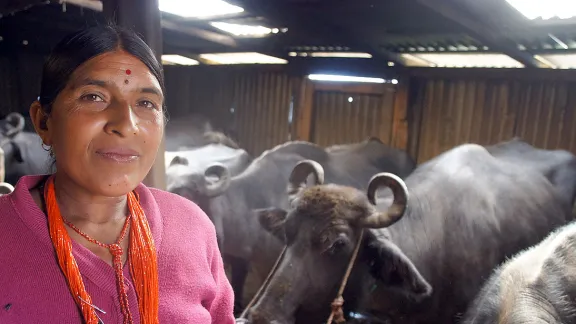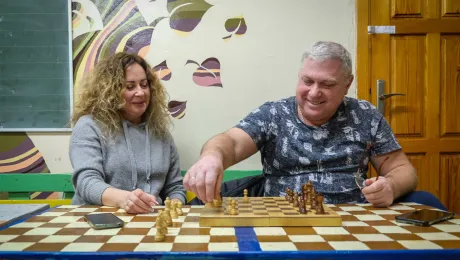
Dil Kumari with the water Buffalo herd she built up with an initial cooperative loan. Photo: LWF/ C. Kästner
Everything about them radiates determination, joy and power. The women’s cooperative in Devichowa village in the district of Lalitpur outside Kathmandu welcome us with flower garlands and the traditional red spot of tika into their new building. It is not quite finished, but set up to welcome guests.
The cooperative is one of the projects LWF is implementing with local organizations, in this case “SOLVE Nepal”. It has 409 members, altogether there are 1,756 members in eight villages. The group started as a credit union, by now it has sub-committees not only for loans but also education and against domestic violence.
Some elderly men sit in the back of the room as the women outline their activities. “I joined the cooperative secretly”, Dil Kumari Ghimire tells us. “I told my family only four months later. My husband said: This is useless, why would you want to be in that group?”
It is a predjudice many of the women face: The cooperative women have not enough work at home, so they go and meddle in other people’s affairs. Especially the group counselling in affairs of domestic violence is regularly confronted with views like these. Some men also forbid that their wife become a member of the cooperative.
The tides are turning, however, because of the economical power the group has. Dil Kumari leads us to her house. It sits on the side of the mountain, overlooking the valley and a large piece of land her family owns. The true wealth however is hidden in a stable: 14 water buffalos and 4 calves. Soon after joining, Dil Kumari took a loan from the cooperative and bought one animal. It’s milk earns her about eight dollars a day. Soon she was able to afford more animals. Dil Kumari, who never attended a school, by local standards is a wealthy business woman. “When I brought home the loan, my husband didn’t say anything anymore”, she smiles. “Now he is happy”.
Another woman, Subhdra Timislsina, adds “It’s a vast difference to earlier times. For each small amount we depended on our husbands. Now we can get loans and have income generating activities. It’s like we were in the dark, now we are in the light”.
Related Blog Posts



